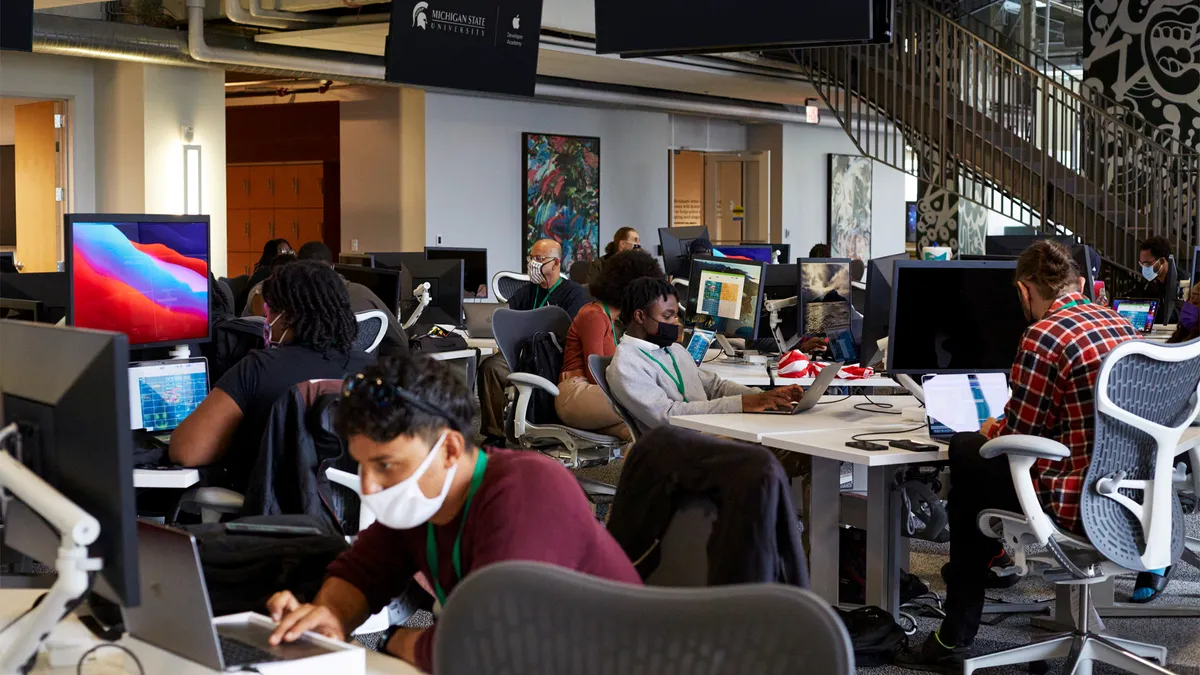The role of managers in the American workplace has shifted dramatically. Gone are the days that managers watch over employees, assessing their every move and correcting every mistake. Today’s manager has to do more to meet the needs and expectations of a talented, independent workforce.
They must serve as coach and mentor, be accessible and remain communicative. Their responsibilities are larger than assuring the work is performed; they have to ensure that workers are content as well. The level of responsibility and accountability placed on managers is greater today than it has ever been.
But for most, the level of training provided to managers hasn’t kept pace with their changing responsibilities. The expectation has been that they will hit the ground running with all the communication, coaching and supervisory skills needed — but that’s proving to be untrue.
What do employees think?
A survey by Ultimate Software and The Center for Generational Kinetics found the number one driver of satisfaction in the workforce is the employee-manager relationship, yet 80% of employees said they could do their job without their manager. The survey also highlights the differences between the perception and experience of managers and staff:
Communication
- 80% of managers think they’re transparent with direct reports; but,
- Only 55% of employees agree.
Access
- 75% of employees say approachability is the most important quality in an effective manager; and,
- 50% of employees say they have an approachable manager.
Leadership
- 71% of managers say they know how to motivate their team; but,
- Only 44% of employees agree.
Training
- 45% of managers report they have never received formal management training.
Many companies provide initial training to new managers, but as the scope of their work and relationships grow, so does their need.
“I think a lot of organizations invest in training for new hires, providing the basics — enough to get employees started in their roles — but then never really follow up from there," Adam Rogers, Ultimate Software’s chief technology officer, said. "We’d all be better served by our employers if the focus was on continuous learning and development, rather than one-time training."
Millennials and management
Many millennials in management roles are in a position most have never encountered before: managing workers older than them. Seasoned employees may believe younger managers lack real world experience. While the millennial manager may have more technological ability, older direct reports may hold more institutional information, leading to problems with credibility and trust. These roadblocks can make it even more challenging to excel in the management role.
The flip side is managing millennials, who have a different set of priorities in the workplace. In a survey of this large and diverse generation, 72% said they want to be their own boss. But if they do have to work for a boss, 79% want their boss to serve as a coach and mentor. Comprising 75% of the world’s workforce by 2025, meeting the needs of this generation will be necessary to keep businesses productive.
Training is now key to retention
For new managers and those in the role for years, training is crucial. “A person’s view of the company they work for is shaped largely by their direct leader," Tony Cicio, VP of Samsung’s People Team, said. "Therefore the development of these leaders is a critical success factor.”
When an employee is promoted from the rank and file to a supervisory position, the challenge can be even greater. Managing those who were friends and peers only yesterday can be difficult.
“The old adage, ‘great managers are born, not made,’ couldn’t be further from the truth," Summer Salomonsen, Chief Learning Officer at Grovo, told HR Dive. "All new managers need training and development to reach their full potential. Management is a skill like any other, that can be broken down into specific habits and behaviors that lead to exceptional performance."
For experienced managers, training is also critical. As their workforce grows and evolves; or new pressures and priorities develop, skills must be honed and adjusted. It’s important to create needs assessments and identify the competencies people need and where they’re lacking.
Cicio suggests then an employer should “expand beyond traditional facilitated learning solutions to craft custom experiences which broker information and foster relationships, and take advantage of the latest technologies.”
In a workplace where generational and cultural differences abound, a trained manager can bridge the gap and capitalize on differences that have the potential to divide. Without the ability to communicate effectively, even outside their comfort zone, engagement and productivity can suffer. But as our workforce continues to evolve, many businesses fail to provide the necessary support to address its needs.
Mentoring managers
Providing a mentor is always beneficial. A sounding board that can offer solutions to challenging situations is an asset most managers want, but it is rarely available. The survey suggests only half of today’s managers have a mentor that helps them develop. Rogers believes “we’re essentially putting managers in the role of motivating and coaching people without giving them the full support they need.”
The role of the manager has shifted substantially in the last decade, from managing processes to talent management. It’s incumbent on employers to adapt learning strategies to meet need if they want to maintain a productive, viable workforce. To do that, initial training, continuous learning and mentorship opportunities must be available to create a management team every worker can rely upon.
“When leaders are genuine and empathetic to people as individuals, when they challenge them to learn new things and provide regular feedback, growth is fueled," Cicio said. "This growth generates new possibilities and allows the partnership between managers and their employees to thrive.”




















